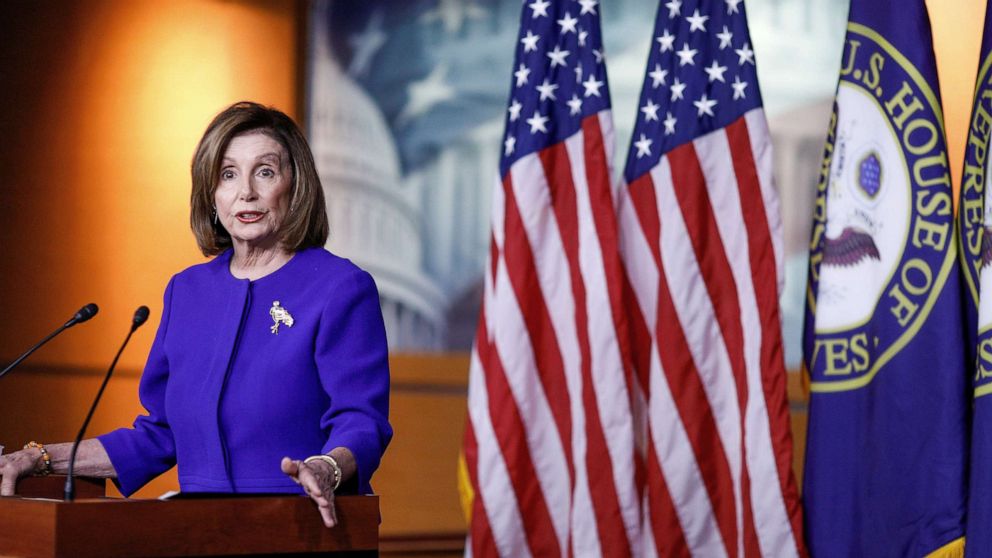House Democrats pass measure limiting Trump's war powers against Iran

The House on Thursday approved a War Powers resolution Democrats said would limit President Donald Trump's ability to take military action against Iran but Republicans claimed was "meaningless" and would undermine his authority as commander in chief.
As Democrats looked to reassert the constitutional power given Congress to authorize war, the non-binding measure passed along mostly party lines, 224-194, with eight Democrats splitting from House Speaker Nancy Pelosi – although three Republicans crossed the aisle to vote with the majority. Independent Rep. Justin Amash of Michigan also voted in favor.
The resolution mandates that, without congressional approval, military hostilities against Iran must end within 30 days.
It goes next to the Senate, where its fate is unclear. A similar measure there, introduced by Sen. Tim Kaine of Virginia, could be voted on as early as next week and Trump was almost certain to veto any attempt to restrict his war-fighting powers.
Before the House vote, Pelosi dismissed Republican criticism that a debate on war powers empowers Iran as "completely foolish," saying "America and the world cannot afford war" and that the measure would "protect American lives and values."

"We will debate on the floor of the House," Pelosi, D-Calif., pledged. "We have no illusions about Iran, no illusions about Soleimani, who was a terrible person," she said, referring to Qassem Soleimani, the top Iranian general killed in a U.S. drone strike last week on Trump's orders. "But it's not about how bad they are, it's about how good we are, protecting the people in a way that prevents war and will not have us producing again and again generations of veterans who are suffering."
Pelosi said the House is advancing what's called a "concurrent resolution" because it does not require the signature of the president of the United States.

"This is a statement of the Congress of the United States and I will not have that statement be diminished by whether the president will veto it or not," Pelosi said.
House Minority Leader Kevin McCarthy told reporters he believes a concurrent resolution is "meaningless" and akin to inviting the soap box derby to hold an event at the Capitol.
"Instead of working with the administration to make America stronger, Democrats are working against us to make us weaker," McCarthy, R-Calif., told reporters at a news conference. "Make no mistake: today's War Powers Resolution cannot become law. By definition, it will never be sent to the president, and it will never limit his constitutional authority to defend the American people."
Earlier Thursday, Rep. Max Rose, a Democrat from New York and Army combat veteran who served in Afghanistan, announced he would vote against the war powers resolution – breaking from his caucus and taking the position that Trump was justified in killing Soleimani.
"President Trump was justified in killing a terrorist who was responsible for the murder of hundreds of American service members and was in the process of planning to kill more," Rose stated.
"Unfortunately, today's War Powers Resolution is a non-binding resolution that simply restates existing law and sends the message that war is imminent. I refuse to play politics with questions of war and peace and therefore will not support this resolution."
As the House debated a procedural measure ahead of consideration of the War Powers resolution, Georgia Republican Rep. Austin Scott argued that Pelosi's quest was "another partisan attack" against Trump -- pointing out that the Obama administration conducted hundreds of airstrikes in areas of non-hostilities.
"This is a political jab at President Trump," Scott contended.
House Minority Whip Steve Scalise told a trio of reporters in his office Thursday afternoon that Congress "should not limit the president's ability to take out terrorists and keep Americans safe," adding that Soleimani was in Iraq "plotting to kill Americans" so Trump has legal cover to order the strike under the 2002 Iraq authorization for the use of military force.
"I don't think the president should be hamstrung from killing terrorists," Scalise, R-Louisiana, said. "You have minutes at best before the target's gone. And if there's a legal requirement that you first have to check in with a whole list of people, you may actually miss that window."
As Pelosi works to rein Trump in amid tensions with Iran, the president is pushing back.

Earlier Thursday morning, the president tweeted an attack directed at Pelosi, saying that she is "crazy" while calling on all House Republicans to vote against the War Powers resolution.
Pressed by ABC Senior Congressional Correspondent Mary Bruce whether she believes the administration has misled the American people about an imminent attack, Pelosi said it was "disdainful" that Trump did not consult Congress and that killing Soleimani has not made the country safer.
"We must avoid war," Pelosi said. "And the cavalier attitude of this administration, it's stunning. The president will say, ‘I inform you by reading my tweets.' No, that's not the relationship that our founders had in mind in the constitution of the United States when they gave power to the White House to do one thing in terms of our national security and to the Congress to declare war and to allocate resources and the rest."
"It's a very big issue now because it's nothing less than preventing war as we honor our first responsibility to protect the American people," she added.
During an event in the Roosevelt Room at the White House Thursday, Trump was asked by ABC News Chief White House Correspondent Jonathan Karl whether he would go to Congress to seek congressional approval to take further military action against Iran.
"It would all depend on the circumstance. I don't have to, and you shouldn't have to because you have to make split second decisions." Trump said. "Sometimes you have to move very, very quickly, Jon. But in certain cases, I wouldn't even mind doing it."



